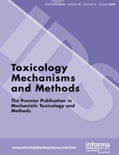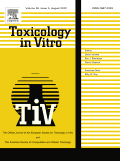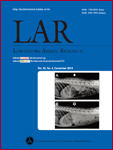
ALTEX-Alternatives to Animal Experimentation
Scope & Guideline
Pioneering alternatives for ethical research.
Introduction
Aims and Scopes
- Promotion of Alternatives to Animal Testing:
The core aim of ALTEX is to advocate for and disseminate research on alternatives to animal experimentation, including in vitro, in silico, and other innovative approaches that replace, reduce, or refine animal use in scientific research. - Focus on Toxicology and Safety Assessment:
The journal highlights research that explores alternative methods for toxicity testing, aiming to improve human health risk assessments without relying on traditional animal models. - Integration of New Approach Methodologies (NAMs):
ALTEX emphasizes the importance of NAMs—methods that harness modern technologies such as 3D bioprinting, microphysiological systems, and computational modeling to provide more human-relevant data. - Interdisciplinary Research:
The scope includes interdisciplinary approaches that span toxicology, pharmacology, regulatory science, and ethics, fostering collaborations across different scientific fields to enhance the development of alternative methods. - Advocacy for the 3Rs Principles:
The journal consistently promotes the principles of Replacement, Reduction, and Refinement (3Rs) in research practices, encouraging scientists to adopt these principles in their methodologies.
Trending and Emerging
- Microphysiological Systems and Organ-on-Chip Technologies:
Research focusing on microphysiological systems and organ-on-chip technologies is rapidly increasing, showcasing their potential for more accurate human-relevant testing and reducing the need for animal models. - Artificial Intelligence in Toxicology:
There is an emerging trend in the application of artificial intelligence and machine learning to enhance predictive toxicology and streamline the analysis of large datasets, marking a significant shift in how toxicity assessments are conducted. - Green Toxicology:
The concept of green toxicology, which emphasizes sustainable practices in chemical safety assessments, is gaining momentum. This trend reflects a broader societal demand for environmentally friendly research methodologies that minimize ecological impact. - Integration of Non-Chemical Stressors in Risk Assessment:
Research that encompasses non-chemical stressors, such as physical and biological factors, in adverse outcome pathways is emerging, indicating a shift towards more holistic approaches in toxicology. - Regulatory Innovations and Frameworks for NAMs:
There is an increasing focus on developing innovative regulatory frameworks that facilitate the acceptance and integration of new approach methodologies, reflecting a proactive stance towards modernizing regulatory science.
Declining or Waning
- Traditional In Vivo Models:
There is a noticeable decrease in publications that utilize or advocate for traditional in vivo animal models. As the field shifts towards more humane and ethical scientific practices, reliance on animal models is becoming less prominent. - Single-Species Testing Approaches:
Research focusing solely on single-species testing methodologies is declining as there is a growing trend towards multi-species and more complex biological systems that better represent human physiology. - Regulatory Acceptance of Animal Models:
The discussions surrounding the regulatory acceptance of animal testing are decreasing, likely due to the increasing momentum towards regulatory frameworks that prioritize alternative methods over traditional animal testing.
Similar Journals

Applied Animal Science
Connecting Scholars to Cutting-Edge DiscoveriesApplied Animal Science, published by Elsevier Science Inc, is an esteemed journal that has quickly made its mark in the fields of Animal Science and Food Science since its inception in 2019. With an ISSN of 2590-2873 and an E-ISSN of 2590-2865, this journal has received commendable recognition, achieving a Q2 ranking in both categories as of 2023. Encompassing a broad scope that integrates cutting-edge research and practical applications, Applied Animal Science seeks to disseminate knowledge that advances the well-being of animal systems and food safety. Researchers and professionals in the agricultural and biological sciences benefit from its high-quality articles, which are ranked #152 out of 490 and #200 out of 389 in their respective fields according to Scopus rankings. While currently not open access, the journal remains accessible to a global audience of scholars eager to explore innovative findings and robust methodologies. As it continues to grow through 2024 and beyond, Applied Animal Science aims to be a pivotal platform for fostering knowledge exchange and inspiring future studies in its domain.

AUSTRAL JOURNAL OF VETERINARY SCIENCES
Empowering Research, Enhancing Animal WelfareAUSTRAL JOURNAL OF VETERINARY SCIENCES is a prominent platform for innovative research in the field of veterinary science, published by UNIV AUSTRAL CHILE, FAC CIENCIAS VETERINARIAS. This journal, bearing the ISSN 0719-8000 and E-ISSN 0719-8132, serves as a vital resource for researchers, veterinarians, and students interested in advancing their knowledge in veterinary practices and animal health. With its influence reflected in its Q3 category ranking in the Veterinary (miscellaneous) field, and its Scopus rank of #95 out of 194, the journal highlights a robust commitment to disseminating valuable findings and insights. Between the years 2017 to 2024, it aims to provide open access to significant advancements and discussions in veterinary science, ensuring that vital research is accessible to a global audience. Located in Valdivia, Chile, the journal emphasizes its role in enhancing veterinary scholarship and fostering professional development within the community.

ACTA VETERINARIA SCANDINAVICA
Unlocking insights for the future of animal care.ACTA VETERINARIA SCANDINAVICA is a prestigious open-access journal dedicated to advancing the field of veterinary science and promoting interdisciplinary research. Published by BMC since 2001, this journal has become a vital resource for veterinarians, researchers, and students worldwide, with an ISSN of 0044-605X and an E-ISSN of 1751-0147. With a remarkable impact factor reflecting its relevance—ranking in the Q2 quartile for Veterinary (miscellaneous) and Q3 for Medicine (miscellaneous)—ACTA VETERINARIA SCANDINAVICA focuses on a broad spectrum of veterinary topics, ensuring that critical research is available to the academic community and beyond. Located in the United Kingdom, this journal has successfully converged its publishing efforts from 1960 to 2024, highlighting its long-standing commitment to veterinary excellence. Researchers are encouraged to submit their work through the journal’s user-friendly platform, contributing to the ever-evolving landscape of animal health and welfare.

TOXICOLOGY MECHANISMS AND METHODS
Empowering researchers with cutting-edge toxicology studies.TOXICOLOGY MECHANISMS AND METHODS is a distinguished peer-reviewed journal dedicated to the advancement of toxicological research, published by Taylor & Francis Ltd. With its ISSN 1537-6516 and E-ISSN 1537-6524, this esteemed journal features critical studies and innovative methodologies in the field of toxicology, aligning with its mission to enhance understanding of biological mechanisms and risk assessment. The journal holds a commendable Q2 ranking in both the Health, Toxicology and Mutagenesis, and Toxicology categories, as well as strong positions in Scopus rankings, reflecting its influence with a 71st percentile rank in Toxicology and a 69th percentile rank in Environmental Health. Researchers, professionals, and students in the toxicology domain will find this journal to be an invaluable resource, offering open access options that foster widespread dissemination of its findings. Since its inception, encompassing converged years from 1991 to 1995 and from 2002 to 2024, the journal remains at the forefront of critical discourse and innovative research methods, making it a vital platform for advancing toxicological science globally.

TOXICOLOGY IN VITRO
Fostering Global Collaboration in Toxicological ResearchTOXICOLOGY IN VITRO is a premier journal published by PERGAMON-ELSEVIER SCIENCE LTD, focusing on the latest advancements in the field of toxicology, particularly through in vitro methodologies. With an ISSN of 0887-2333 and an E-ISSN of 1879-3177, this journal serves as a critical platform for researchers aiming to disseminate their findings in toxicology, emphasizing innovative approaches and applications in pharmacology and toxicology. Featuring a commendable impact factor and classified in the second quartile (Q2) for both Medicine (miscellaneous) and Toxicology in 2023, the journal holds a significant position within the academic community, ranking 41st out of 133 in the Toxicology category according to Scopus, representing the 69th percentile. Despite being a subscription-based publication, it continuously attracts submissions from leading scientists worldwide, fostering a vibrant exchange of scientific knowledge. Since its inception in 1987, TOXICOLOGY IN VITRO has consistently aimed to enhance understanding of toxicological challenges, making it an invaluable resource for professionals, students, and researchers dedicated to developing safer pharmaceuticals and understanding the biological pathways influenced by potential toxic agents.

Laboratory Animal Research
Empowering researchers for a better scientific future.Laboratory Animal Research is a prominent academic journal dedicated to advancing the field of laboratory animal science, providing a platform for researchers, professionals, and students focused on biochemistry, genetics, and molecular biology. Published by SPRINGERNATURE, this journal is recognized for its rigorous peer-review process and commitment to high-quality research, achieving a notable Q2 ranking in the Biochemistry, Genetics and Molecular Biology category as of 2023. Since becoming an Open Access journal in 2015, Laboratory Animal Research has fostered greater accessibility and dissemination of research findings, encouraging collaboration and innovation within the scientific community. With its ISSN 1738-6055 and E-ISSN 2233-7660, the journal is based in the United Kingdom and resides at CAMPUS, 4 Crinan St, London, N1 9XW, England. It is an essential resource for anyone involved in laboratory animal research and strives to enhance the welfare and scientific use of animals in research settings.

Journal of Veterinary Science
Advancing Veterinary Knowledge, One Study at a Time.Journal of Veterinary Science, published by the Korean Society of Veterinary Science, is a distinguished peer-reviewed Open Access journal that has been contributing to the field of veterinary medicine since its inception in 2000. With an E-ISSN of 1976-555X, this journal not only provides critical insights for researchers globally but also maintains a strong presence within the academic community, evidenced by its impressive ranking in the Scopus database, where it stands at 44 out of 194 in the general veterinary category, placing it in the 77th percentile. The journal’s impact factor reflects its rigorous standards and the significance of the research it publishes, all while offering unrestricted access to its content since 2006, which promotes the free exchange of knowledge. Situated in the vibrant academic atmosphere of Seoul, South Korea, the Journal of Veterinary Science aims to advance veterinary research and practice, covering a broad spectrum of topics to inspire students, professionals, and established researchers alike to push the boundaries of veterinary science.

INRAE Productions Animales
Connecting Researchers and Practitioners for a Sustainable FutureINRAE Productions Animales is a prominent journal dedicated to advancing the field of animal production and management, published by the esteemed INRAE (National Research Institute for Agriculture, Food and the Environment). With its commitment to open access, this journal provides a platform for researchers, professionals, and students alike to disseminate high-quality research and innovative practices that address the challenges and advancements in animal production systems. Although the journal’s specific impact factor is currently not available, its contributions are crucial in bridging scientific knowledge with practical application in agriculture. Based in France at 1 rue Pierre-Gilles de Cennes, CS10030, Antony 92761, this journal serves as an essential resource for anyone dedicated to enhancing the sustainability, efficiency, and welfare of livestock production. With a focus on interdisciplinary studies, it aims to foster collaboration among the scientific community, policymakers, and industry stakeholders.

EXPERIMENTAL ANIMALS
Fostering excellence in veterinary and animal science research.EXPERIMENTAL ANIMALS is a leading journal that serves the vibrant fields of Animal Science, Veterinary Medicine, and Biochemistry, Genetics, and Molecular Biology, published by the prestigious INT PRESS EDITING CENTRE INC in Japan. Boasting an impressive track record since its inception in 1974, the journal has positioned itself as a crucial platform for researchers aiming to disseminate innovative findings in experimental animal research. With a commendable impact factor and categorized in the Q2 and Q3 quartiles by Scopus in various relevant fields for 2023, EXPERIMENTAL ANIMALS exemplifies excellence in its contributions to science. The journal offers a comprehensive range of articles spanning from animal welfare and experimental methodologies to genetic studies, ensuring a multidisciplinary approach that appeals to a diverse audience of researchers, professionals, and students. Access to its wealth of knowledge fosters significant advancements in research and practice, underlining the journal's commitment to enhancing understanding of animal models in scientific inquiry.

JOURNAL OF THE INDIAN INSTITUTE OF SCIENCE
Connecting scholars through groundbreaking research.JOURNAL OF THE INDIAN INSTITUTE OF SCIENCE, published by Springer, is a prestigious multidisciplinary journal with a strong foundation in advancing scientific knowledge since its inception in 1974. With a notable Q2 ranking in its category as per the 2023 metrics and an impressive Scopus ranking within the top 20% of its field, it serves as a vital platform for researchers, students, and professionals to disseminate and access groundbreaking studies and innovative ideas. The journal covers a wide range of disciplines, catering to diverse interests and fostering interdisciplinary collaboration among scholars. As a testament to its impact within the scientific community, the journal continues to contribute significantly to the global landscape of research and knowledge sharing. While it currently does not offer an open-access model, its traditional publication format ensures rigorous peer review and high-quality content that remains a trusted resource for those in academia and industry alike. The journal is headquartered in New York City, ensuring a global outreach to its readership.